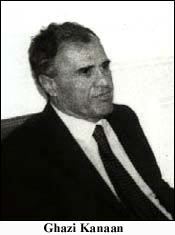 |
| Vol. 4 No. 10 | Table of Contents MEIB Main Page | October 2002 |
 |
Al-Qaida in Lebanon?
On September 28, the Lebanese authorities arrested three suspected members of Al-Qaida after being tipped off by Western intelligence agencies that they were planning to set up a training camp in Lebanon for the group's operatives. This latest development - the first public acknowledgment by the Lebanese government that Al-Qaida operatives have entered the country - follows a stream of Western and Israeli press reports that Osama bin Laden's once-mighty global terrorist network is rebuilding itself in Syrian-occupied Lebanon.
Nasrallah is Focus of Argentine Investigation into 1994 Bombing
The London-based daily Al-Sharq al-Awsat reported on October 1 that Argentina asked Interpol to issue a warrant for the arrest of Hezbollah Secretary-General Hassan Nasrallah in connection with the 1994 bombing of the Argentine-Israeli Community Center in Buenos Aires, which killed 85 people. The report quoted Federal Judge Juan Jose Galeano, who has led the eight-year investigation into the attack, as saying that "conclusive evidence has been found confirming the role of Iran and Lebanon's Hezbollah in the bombing operation."
A spokesman for the Argentinean government denied that it had requested Nasrallah's arrest, but said that the authorities had sent Interpol a series of questions about Nasrallah and are considering issuing a formal request for his arrest.
|
Jumblatt Returns to the Fold
Druze leader Walid Jumblatt has returned to the fold after more than three years of flirtation with mainstream opponents of the Syrian occupation. His change of heart apparently began in May of this year, when Syrian Vice-president Abdul Halim Khaddam paid him a lengthy visit at his ancestral home in Mukhtara. Afterwards, he suddenly began to defend the occupation with renewed vigor, telling the Daily Star on July 1, "We need strong security ties with the Syrians at the level of intelligence, central intelligence, and at the level, maybe, of maintaining Syrian troops." Ominously, Jumblatt has begun making frequent references to the "joint sovereignty" of Syria and Lebanon. In August, he declared that he was not opposed to the unconstitutional extension of Lahoud's term in 2004.
Until 1998, Jumblatt had been a loyal ally of Damascus, but following the election of Emile Lahoud, which cost him his cabinet portfolio, he began to decry the "militarization" of Lebanese politics. After teaming up with Christian opposition candidates in the Fall 2000 parliamentary elections, he joined the opposition in calling for the Syrians to set a timetable for withdrawal. After criticizing Syria in a live parliamentary speech later that year, he was declared persona non grata in Damascus and one of Syria's allies in Lebanon even made a veiled threat to assassinate him.
Only in Lebanon . . .
Late last month, several parts of Lebanon experienced a power outage, affecting hundreds of thousands of people. Electricite du Liban, a state-owned utility, did not answer any phone calls during the blackout, Afterwards, it released a statement attributing the power outage to "high humidity levels and a sudden increase in atmospheric pressure."
A commercial aired on LBCI TV last month, which showed Albert Einstein unable to figure out how a country with 3 million people and government revenues of $3 billion can pay off a debt of $30 billion, was taken off the air by the television station following a "request" by the head of the National Audiovisual Media Council, Abdel-Hadi Mahfouz.